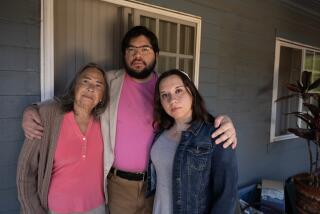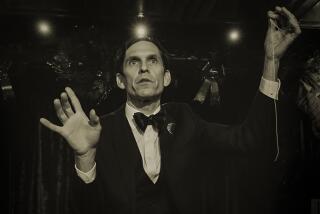Atlanta Freaknic party runs up against mayor
- Share via
Reporting from Atlanta — All across this Southern metropolis, they are wondering, with dread or titillation, whether the raucous, raunchy street party called Freaknic will be back -- and whether, like some unslayable B-movie monster, it will once again take over the city.
Atlanta Mayor Kasim Reed even lapsed into horror-flick argot as he spoke this week about rumors of “the ‘Return of Freaknic’ or ‘Baby Freaknic’ or ‘Freaknic’s Cousin’ or a Freaknic kind of event coming to town this weekend.”
FOR THE RECORD:
Freaknic: An article in Friday’s Section A about the Atlanta street party Freaknic said the tradition started in Washington, D.C. It was started in Atlanta by college students from the Washington area. —
The mere mention of Freaknic has the power to freak out many Atlantans. Also known for a while as Black College Spring Break, the yearly gathering drew as many as 200,000 young people from around the country at its 1994 peak.
Revelers cruised in cars in a citywide party, snarling traffic, taxing city resources, and offending Bible Belt sensibilities with public drinking, lascivious dancing and nudity. It was a staple of Atlanta springtime through most of the 1990s, until a crackdown by municipal leaders killed it off.
Or so they thought.
This year, a number of party promoters have been promising to resurrect Freaknic with the help of Web-based social networking that plays on a new generation’s suspicion that it missed out on one heck of a throw-down.
“I used to hear about how much fun it was,” said Dontea Mitchell-Hunter, 19, a sophomore at Spelman College, one of the city’s historically black colleges.
“Most people are hoping it will happen,” added classmate Lovetta Bradley, 20, who’s been receiving Freaknic-themed e-mails from club promoters all week. “But nobody knows if it is going to happen.”
No one is sure how many partyers will heed the call. But the effort prompted a worried Mayor Reed to call a news conference Wednesday, at which he promised to step up the city’s police presence, and chided promoters for failing to seek permits for some of the events.
Reed called Atlanta a welcoming place, but added: “I want to assure residents and business owners that there will not be a takeover of Atlanta [on] my watch.”
Reached by phone Thursday, promoter Davinci Barcelo said he wasn’t trying to spark a citywide party. All of his parties, he said, were planned for private venues and perfectly legal.
Another promoter, J.K. Jones, struck a more defiant tone. On his Freaknic Atlanta website, amid flashing photos of thong-clad women, he announced that he would run for mayor in three years. “We have a strong local base of law-abiding citizens that want this event back in Atlanta,” he wrote.
Freaknic’s origins were innocent enough. It was started in the early 1980s as an outdoor party in Washington, D.C., for black college students -- its name a mash-up of “picnic” and the various freak-themed disco songs of the era.
But as it grew in size, it grew harder to control. Many of the participants in later Freaknics had no ties to college. Public stripping and groping of women became commonplace. The Freaknic in 1995 was marred by looting at malls, hundreds of arrests and reports of sexual assault.
In succeeding years, Atlanta, under Mayor Bill Campbell, tried to better organize the event, but also cracked down with aggressive policing and by cordoning off sections of the city.
By 1999, Freaknic had pretty much fizzled. Then as now, Atlanta’s mayor was African American, but that didn’t stop the charge that the crackdown derived from deep racial tensions. Some of Campbell’s black critics charged him with kowtowing to white paranoia.
Tom Wolfe opened his satirical novel “A Man in Full” with an exuberant description of Freaknic, in which the kids were “freaking out White Atlanta, scaring them indoors, where they cower for three days, giving them a snootful of the future.”
Observers noted that the Freaknic activities were no different than the high jinks of white kids on spring break at the beach.
Barcelo is among those who note that the mayor attended Freaknic when he was a student at Howard University. Reed, 40, said that was back when it was a “well-organized event” for college students.
Councilman H. Lamar Willis stood with the mayor at his news conference, even though he too had attended Freaknics in the early 1990s. He came to recognize, he said, that Freaknic was a free party for young people with little income -- which meant little revenue for Atlanta.
So what, he was asked, would he say to the students today who want to experience Freaknic? Willis paused, then smiled.
“You missed it.”
richard.fausset@ latimes.com
More to Read
Sign up for Essential California
The most important California stories and recommendations in your inbox every morning.
You may occasionally receive promotional content from the Los Angeles Times.










